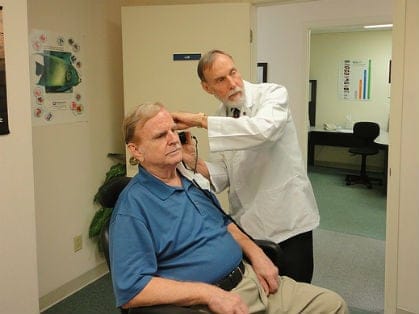 When most people think of Social Security Disability, they generally picture people who fall into one of two categories:
When most people think of Social Security Disability, they generally picture people who fall into one of two categories:
- adults who are no longer able to work due to a sudden disabling injury or illness
- or people disabled at birth or in early childhood or young adulthood
However, there is a third category of people who may be eligible for Social Security Disability — those who suffer from a progressive disability that only gradually removes their ability to work.
Hearing loss is not always disabling, but in some cases previously-hearing people have lost the ability to maintain employment as their hearing loss worsens.
People suffering from disabling hearing loss may qualify for Social Security Disability payments to help make ends meet.
Can You Receive Social Security Disability for Hearing Loss?
The short answer is yes, if you meet the eligibility requirements. Let’s take a closer look.
How Does the Social Security Administration Determine SSD Eligibility?
When determining an individual’s eligibility for Social Security Disability, the SSA uses an internal medical guide often called “the Blue Book”. You can find an online copy of some of the descriptions of disabilities in the Blue Book right here.
Essentially, in order to qualify for disability due to hearing loss, you’ll need to meet the Blue Book’s eligibility criteria, which you can find listed under section 2, “Special Senses and Speech.”
The qualifications are specific and a bit technical, so a hearing test will need to be performed by a qualified hearing care professional in order to ensure that your hearing loss meets the disability requirements in the Blue Book.
This test is a required part of the evaluation performed by the Social Security office.
If you’ve already been seeing a medical professional who specializes in hearing care, ask them to perform the test. If not, ask your primary care physician for a referral.
What Types of Hearing Loss Does the Blue Book Recognize?
Essentally, the Social Security Administration recognizes two kinds of hearing loss that may qualify for disability — hearing loss not treated by cochlear implants, and hearing loss that is treated using cochlear implants.
To be approved under the section that covers hearing loss not treated by cochlear implants, you’d need to meet this criteria:
- An average air conduction hearing threshold of 90 decibels (dB) or greater in the better ear
- An average bone conduction hearing theshold of 60 dB or greater in the better ear
- OR, a word recognition score of 40% or less in the better ear, determined using a standardized list of phonetically balanced monosyllable words.
As far as those individuals who have had cochlear implant surgery, but still feel they are unable to maintain employment and need disability to help cover the costs of daily life, there are separate guidelines to cover eligibility there.
Since it takes time for the ear and brain to adjust to the new sound recognition capabilities a cochlear implant offers, cochlear implanation is in and of itself considered a disability for one full year after surgery during recovery.
After the first year, you may still qualify for disability benefits if you recognize 60% of words or less using the Hearing in Noise Test, or HINT. This test must also be provided by a qualified hearing professional.
If you haven’t previously had any of these tests done, now is the time. If you have been considering cochlear implantation as a way to recover some hearing capabilities, be sure to look into disability eligibility as a way to help cover costs while you recover.
Can You Work and Receive Disability for Hearing Loss?
If an individual meets the criteria for receiving Social Security Disability for hearing loss but still earns more than $1,190 per month, they will not qualify for disability benefits. If you are able to maintain some employment, it’s worth looking into whether or not your employer could modify your job to accomodate your hearing loss or if you are able to take a job where good hearing is not a requirement for employment.
Please keep in mind that all hearing tests are evaluated on the “best ear” by the Social Security Administration. Someone who only has hearing loss in one ear, even if that loss is total, may not qualify if they are still able to hear on the other side.
How Do I Apply for Disability for Hearing Loss?
You can begin the application process online through the Social Security Administration’s website, or apply in person at your local Social Security office. If you choose to go in person, it’s best to call ahead to schedule an appointment.
Since the Social Security Disability process often takes two years or more from initial application to final decision, and many applications are originally denied before being approved upon appeal, it’s in your best interest to make sure all your documentation, test results, and everything else you can show that relates to your hearing loss is in order.
Scheduling a consultation with a legal representative who has experience in working with Social Security Disability claims can help you to prepare and present your need for disability more effectively at your first appointment, or they may be able to provide help later on if you initially receive a denial.
Request a Free Social Security Disability Consultation
At Bluestein Attorneys, we have experience working with individuals seeking Social Security Disability benefits. We’d be happy to sit down with you to discuss your unique situation and give you the information you need to decide on the next best step for you.
Request your free Social Security Disability consultation by calling us at (877) 524-4675 or contacting us online at any time.



